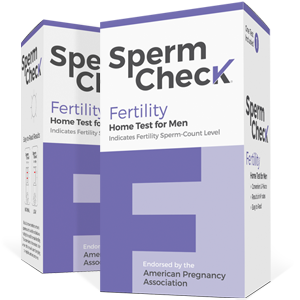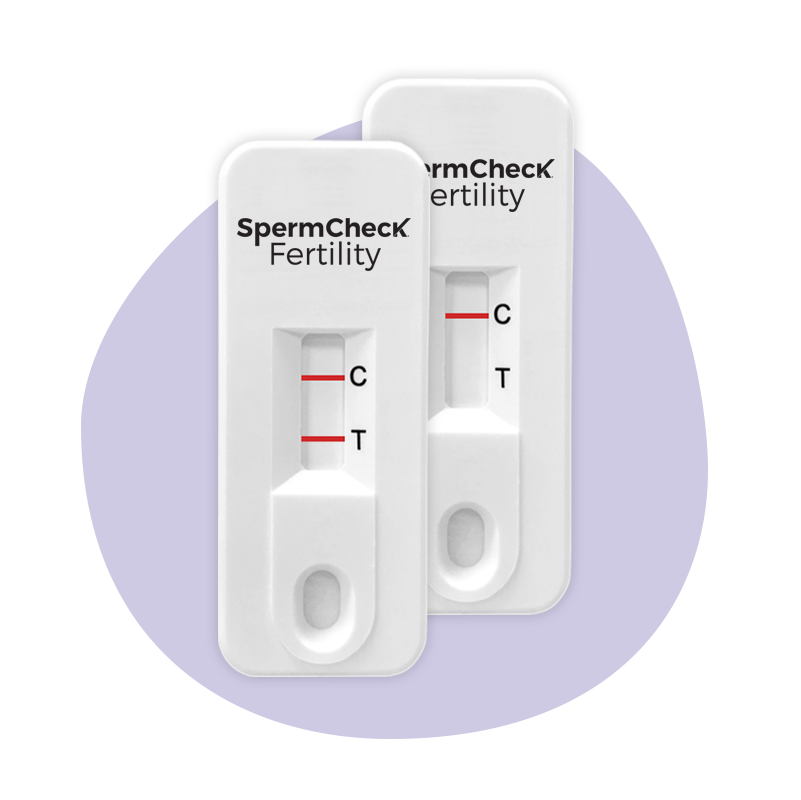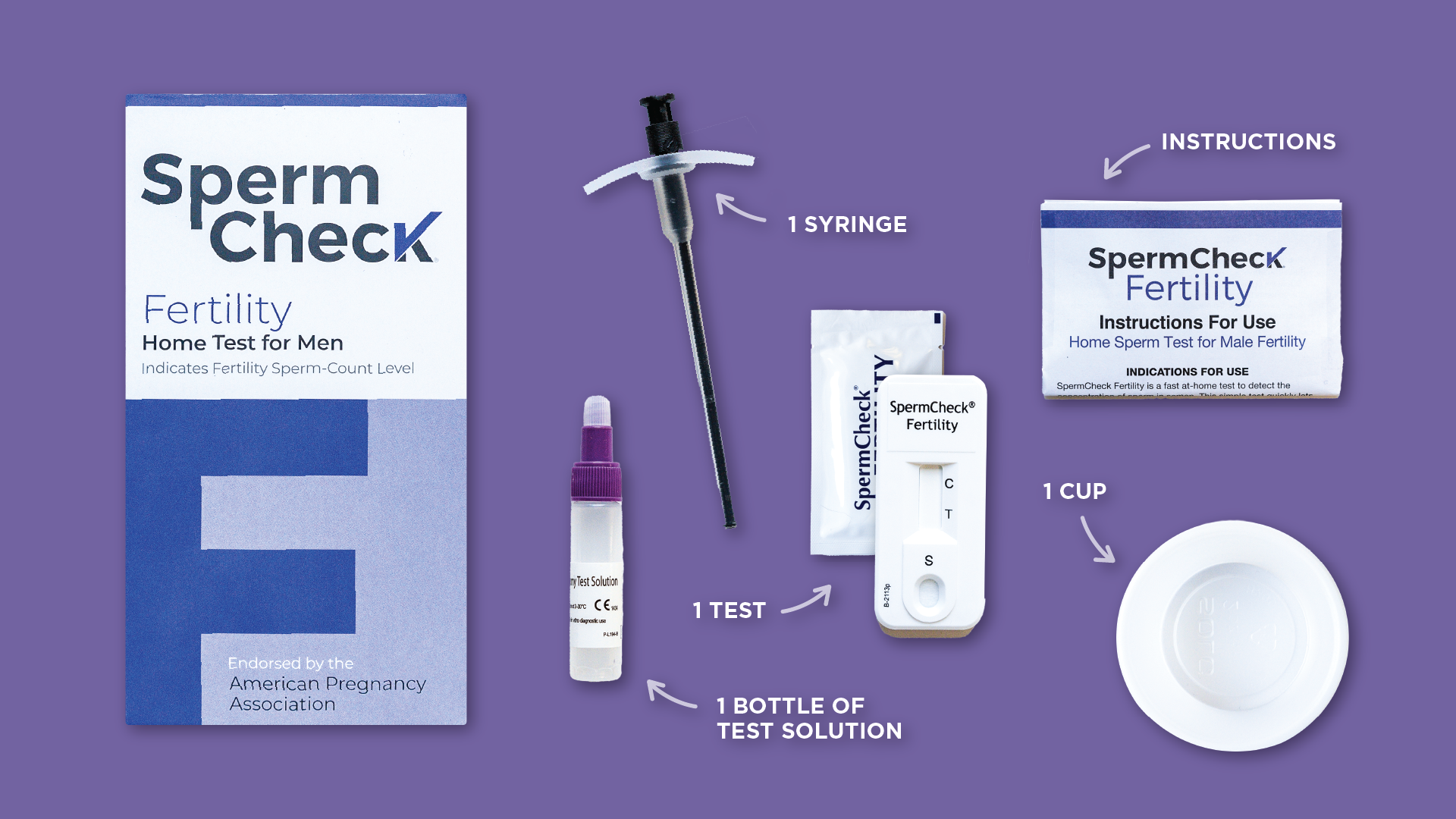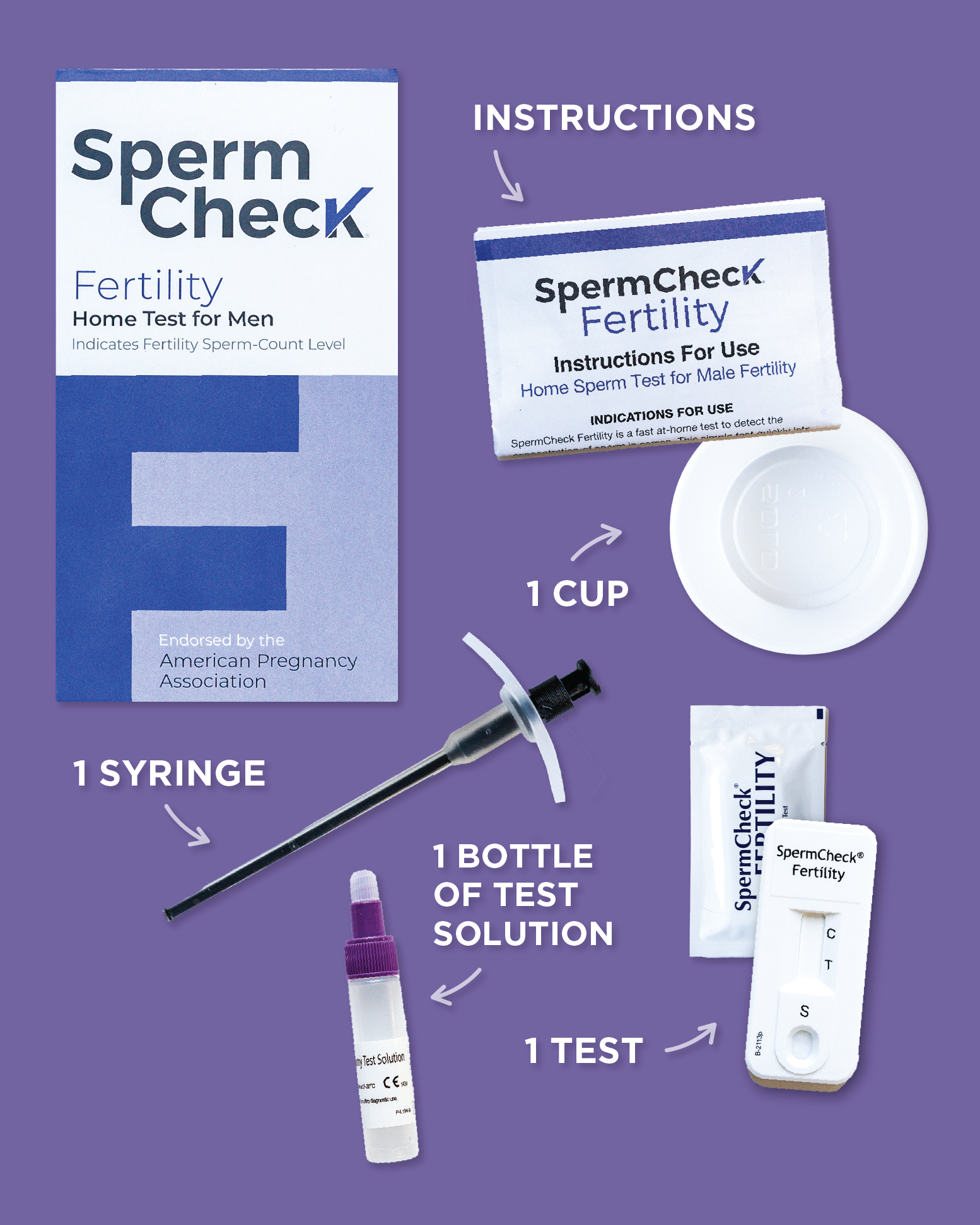25% off 1-Pack Fertility TODAY with code VALENTEST
or get $30 off a 2-Pack, discount applied automatically.
25% off 1-Pack Fertility TODAY with code VALENTEST
or get $30 off a 2-Pack, discount applied automatically.
Repeat testing is important to track progress over time.
Orders placed by 12pm M-F ship same day. Orders after 12pm or on weekends ship next business day.
Nearly 1 in 6 couples struggle to conceive after trying for one year.
In one-third of all cases of couples who struggle with infertility, a low male sperm count is responsible. 1
However, fertility testing often focuses only on the woman’s health. Many couples often spend thousands of dollars on testing for her without testing for him, and male infertility can often be pushed to the side in the long, frustrating search for answers.
Join over 1 million couples who have found their first step towards understanding their fertility journey with SpermCheck.
With SpermCheck Fertility, men can get quick, low-cost answers about their sperm levels at home, giving them the knowledge they need to take the next step in their fertility journey.
Skip the doctor’s office and get answers within minutes in the comfort and privacy of your own home.
Use an affordable at-home test before spending thousands on expensive procedures.
Find out if low sperm levels could be at the root of your infertility, and start down the path toward answers.
25% off 1-Pack Fertility TODAY with code VALENTEST
or get $30 off a 2-Pack, discount applied automatically.
Sonia is a multifaceted health and wellness expert with a background in business.
Sperm levels can be impacted by a variety of factors ranging from diet, weight, and stress levels, to hormone imbalances, medications, or underlying health conditions.
However, many of these factors can be addressed through lifestyle changes or working with your healthcare provider, and taking action could help your sperm count increase to a normal level. With regular at-home testing from SpermCheck, you can see if these changes are impacting your sperm levels.
Discount applied automatically at checkout.
Buy 2-Pack $68
Your test will be delivered right to your doorstep.
Take the test in the privacy and comfort of home. You’ll get results in just minutes!
Equipped with answers, you can take your next step in your fertility journey with confidence.
25% off 1-Pack Fertility TODAY with code VALENTEST

Simply collect your semen sample at home, then follow the simple directions to read your sperm count results within minutes.
Questions or concerns? We’re here to help! Contact us or see our return policy.


Urologist-recommended for checking sperm count.
SpermCheck Fertility and SpermCheck Vasectomy are both cleared by the FDA.
We’ve helped many families check fertility in the comfort of home.
Detects the levels of SP-10, a protein only present in sperm.
SpermCheck Fertility is easy to use, providing fast, easy-to-read results. Similar to a pregnancy test, this test uses colored lines to inform you if there is a normal or low sperm count. Done in the privacy of your own home, a semen sample is placed in the solution bottle provided and the two are mixed. As indicated in kit instructions, drops of the mixture are placed in the testing device, which measures the sperm count level in the sample. All the contents needed for testing are in the package. The patented process of sperm detection is made possible by a protein found exclusively in the head of mature sperm. In just minutes, the results indicate a normal (positive result) or below normal (negative result) sperm count.
Each test kit includes:
A positive result (two lines) indicates that sperm count is at least 20 million per milliliter, a level that is considered a “normal” male fertility level. A positive result from a sperm test for fertility by itself does not prove that the man is fertile since there are other factors that can influence a man’s ability to father a child. However, it will indicate that sperm count is not the issue. If you have ruled out sperm count as the issue, and are still unable to conceive a baby after six months, both the male and female should have full fertility evaluations by a physician, even if your SpermCheck Fertility test result was positive.
A negative (one line) result indicates that sperm count is less than 20 million per milliliter, which would likely create conception issues. However, some men with sperm counts below this level are still able to father a baby naturally. It is also important to understand that sperm count can vary from day to day, or improve with lifestyle changes, so it is possible that you might get a positive result if you were to wait a while and take the test again. You should consult a physician if your sperm count test result is negative, particularly on subsequent SpermCheck Fertility home tests.
In some cases, aspects of the male reproductive system may change if you have certain underlying conditions. If medical conditions are a concern for you, consult with your primary care physician to discuss potential risks and interventions. Early diagnosis and intervention can play a pivotal role in optimizing fertility outcomes and increasing healthy sperm counts.
Hormonal imbalances, structural anomalies, infections/increased count of white blood cells, and/or certain medications can cause male infertility or affect specific metrics like:
For the male reproductive system, a typical healthy concentration of sperm is 15 million sperm per milliliter or more. Sperm analysis results that are lower than 15 million sperm per milliliter would be considered low sperm count.
In some cases, sperm count may increase if an underlying condition can be identified and treated. However, the following dietary and lifestyle changes can also help a man increase his sperm count:
Due to concerns about male factor infertility, many men are turning to home sperm tests as an initial step in male fertility testing. However, it’s important to note that sometimes a comprehensive male fertility test from your doctor is also necessary. Both at-home and in-office semen analysis tests can provide accurate insights and identify abnormal results.
If you have a negative result on the SpermCheck Fertility test, either once or on a subsequent test, speak to your physician. Additionally, experts base their advice for when to seek treatment on the woman’s age and how long you’ve been having unprotected sex:
Age 35 or younger: See your physician (gynecologist, general practitioner, urologist) if you haven’t conceived after 10 to 12 months. A year can seem like a long time, but most younger couples will conceive within a year of trying if there are no other issues. After a year of trying, a complete semen analysis may be beneficial.
Store in a cool, dry place at 36°–86°F (2°–30°C). Do not freeze.
We’re here to help. If you received an invalid result, are missing pieces, or have another issue with your test, please fill out our Product Support Form or email [email protected] with your mailing address, receipt, a photo of the test, and the lot number. Our team will review and assist you as quickly as possible.